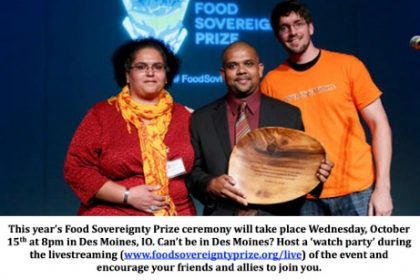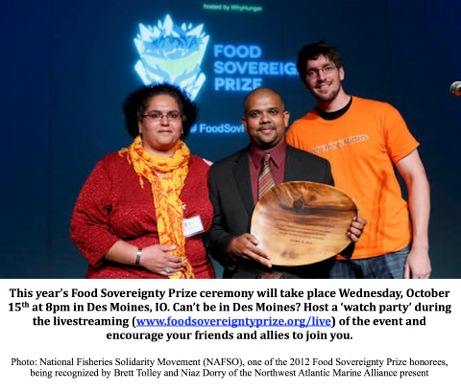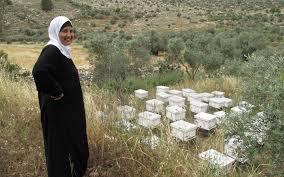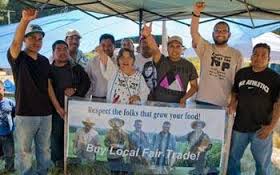
 What is food sovereignty? I come from a four-generation commercial fishing family and while growing up I’d never heard the term – food sovereignty. But since then, I’ve come to understand that food sovereignty was actually embedded in most of my family’s culture and conversation and I just didn’t know it.
What is food sovereignty? I come from a four-generation commercial fishing family and while growing up I’d never heard the term – food sovereignty. But since then, I’ve come to understand that food sovereignty was actually embedded in most of my family’s culture and conversation and I just didn’t know it.
My first memory of food sovereignty happened at age 8, when at a family cookout, as usual, the picnic table conversation turned to fisheries policy. My grandfather said, “our way of fishing is a way of life, and that way of life is slowly being taken from us.” As I’ve grown older and learned about the struggle of family fishers and farmers and people around the world to determine their own food, agriculture, and fishing policies – I realize that my grandfather was talking about the loss of food sovereignty.
Reclaiming this loss and re-envisioning a more democratized food system and just society is what food sovereignty is all about and is also at the core of our work at the Northwest Atlantic Marine Alliance (NAMA) and of many of our partnering networks like Food Solutions New England and the US Food Sovereignty Alliance.
This year, NAMA had the privilege to help plan the US Food Sovereignty Alliance’s ‘Food Sovereignty Prize’, which honors leaders from the frontlines of the fight for food as a human right. In addition to recognizing community leaders, the Food Sovereignty Prize is a direct protest to the World Food Prize because the WFP no longer represents the needs of those who are deprived of food the most.
This year’s ceremony will take place Wednesday, October 15th at 8pm in Des Moines, Iowa. If you can’t make it to Des Moines, no worries, you can still host a ‘watch party’ during the livestreaming of the event and encourage your friends and allies to join you.
This year’s US Food Sovereignty Prize goes to the Union of Agricultural Work Committees (UAWC) of Palestine and Community to Community Development (C2C) of Bellingham, WA for their courage and commitment to community-led efforts to end injustice in their communities. Read more about these two organizations below.
Connecting Land and Sea
Even though we are now talking about food sovereignty, fisheries aren’t always incorporated in that conversation. This is a problem because in fishing and farming, a handful of international businesses are trying to control more and more of the world’s seeds, food retail, livestock, and fishing rights, and thus jeopardizing food sovereignty everywhere. Meanwhile, the United Nations estimates that almost 1 billion people are hungry and suffering because their livelihoods as food producers are under constant threat by land and ocean grabs and corporate consolidation – not because the world isn’t producing enough food.
Help us spread the word about this year’s Food Sovereignty Prize ceremony and build solidarity with those fighting for food sovereignty.
2014 Food Sovereignty Prize Honorees
Representing communities whose human rights to food, land and life are in constant violation – farming and fishing families in Palestine’s occupied West Bank and Gaza and indigenous Mexican immigrant farm worker communities in Washington State – these two organizations are being honored for their work to reclaim their human right to food through food sovereignty, the democratic recognition of full human rights, and for their commitment to the leadership of those most impacted by the policies that produce hunger and diminish access.
“These organizations represent communities fighting for their rights and against the forces that make their struggles invisible. The Food Sovereignty Prize shows how food sovereignty is the path toward a just society,” said Kathy Ozer, National Family Farm Coalition, member of the US Food Sovereignty Alliance.
By honoring these two distinguished organizations, the US Food Sovereignty Alliance and its 32 member organizations reaffirm that food sovereignty is the solution to end structural inequality and violence expressed in hunger and poverty and debunk the myth that growing more food will end hunger.
 UAWC, a Palestinian small farmers’ movement, was formed in response to the socio-political conditions that Palestinian farmers were facing and now continue to face. Because of Israeli occupation policies, Palestinian farmers are unable to sell produce at markets, cannot access the sea to fish, and face the confiscation and destruction of their land and water to make way for illegal settlements. Besides working for recognition of Palestinians’ rights to food, UAWC also builds solutions in the communities, from seed banks to cooperatives to extension services for farmers, works for the rights of women, and coordinates humanitarian relief.
UAWC, a Palestinian small farmers’ movement, was formed in response to the socio-political conditions that Palestinian farmers were facing and now continue to face. Because of Israeli occupation policies, Palestinian farmers are unable to sell produce at markets, cannot access the sea to fish, and face the confiscation and destruction of their land and water to make way for illegal settlements. Besides working for recognition of Palestinians’ rights to food, UAWC also builds solutions in the communities, from seed banks to cooperatives to extension services for farmers, works for the rights of women, and coordinates humanitarian relief.
 C2C, a food justice solidarity organization, is “led by women of color that have lived the reality that U.S. history reveals; that people of color, women, and poor and low income communities have been excluded from the promise of ‘life, liberty and the pursuit of happiness’ so eloquently expressed in our great country’s Declaration of Independence.” In particular, C2C works with migrant farm worker communities in Washington State whose families are indigenous to Mexico with deep agricultural traditions. They are using their skills, knowledge, and culture to produce food for the U.S., but face the structural violence of deportation, detention, firings, and poverty and their rights to food, land, freedom, and respect are constantly violated.
C2C, a food justice solidarity organization, is “led by women of color that have lived the reality that U.S. history reveals; that people of color, women, and poor and low income communities have been excluded from the promise of ‘life, liberty and the pursuit of happiness’ so eloquently expressed in our great country’s Declaration of Independence.” In particular, C2C works with migrant farm worker communities in Washington State whose families are indigenous to Mexico with deep agricultural traditions. They are using their skills, knowledge, and culture to produce food for the U.S., but face the structural violence of deportation, detention, firings, and poverty and their rights to food, land, freedom, and respect are constantly violated.
“The honorees of this year’s Food Sovereignty Prize should remind people that, as the farm labor leader Cesar Chavez said, ‘Our struggle is not about grapes or lettuce, it is about people,’” said Alison Cohen, WhyHunger, member of the US Food Sovereignty Alliance. “This year’s honorees also remind us that hunger exists because of an unjust food system that denies communities their basic human right to food, land and a living wage, not because people don’t know how to grow crops or aren’t working.”
Brett Tolley is the Community Organizer for the Northwest Atlantic Marine Alliance.




